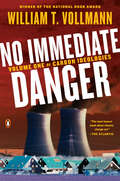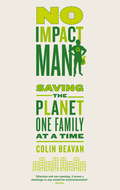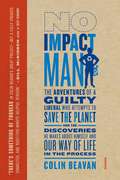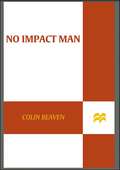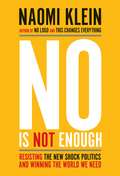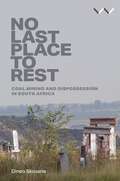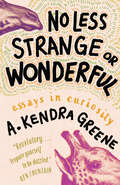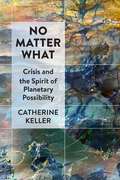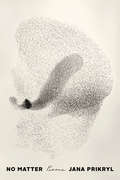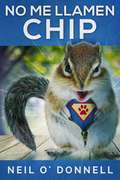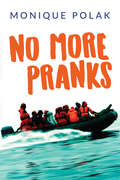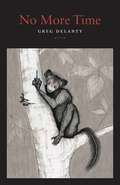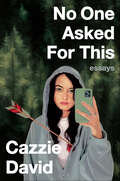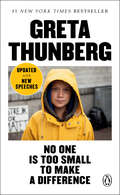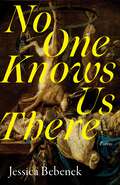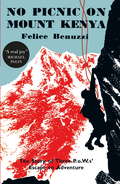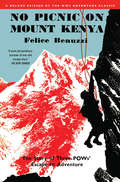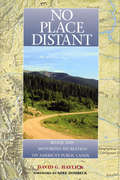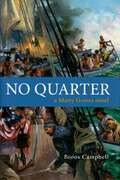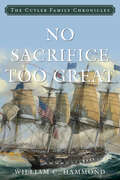- Table View
- List View
No Immediate Danger: Volume One of Carbon Ideologies
by William T. VollmannA timely, eye-opening book about climate change and energy generation that focuses on the consequences of nuclear power production, from award-winning author William T. VollmannIn his nonfiction, William T. Vollmann has won acclaim as a singular voice tackling some of the most important issues of our age, from poverty to violence to the dark soul of American imperialism as it has played out on the U.S./Mexico border. Now, Vollmann turns to a topic that will define the generations to come--the factors and human actions that have led to global warming. Vollmann begins No Immediate Danger, the first volume of Carbon Ideologies, by examining and quantifying the many causes of climate change, from industrial manufacturing and agricultural practices to fossil fuel extraction, economic demand for electric power, and the justifiable yearning of people all over the world to live in comfort. Turning to nuclear power first, Vollmann then recounts multiple visits that he made at significant personal risk over the course of seven years to the contaminated no-go zones and sad ghost towns of Fukushima, Japan, beginning shortly after the tsunami and reactor meltdowns of 2011. Equipped first only with a dosimeter and then with a scintillation counter, he measured radiation and interviewed tsunami victims, nuclear evacuees, anti-nuclear organizers and pro-nuclear utility workers.Featuring Vollmann's signature wide learning, sardonic wit, and encyclopedic research, No Immediate Danger, whose title co-opts the reassuring mantra of official Japanese energy experts, builds up a powerful, sobering picture of the ongoing nightmare of Fukushima.Watch for No Good Alternative, the second volume of Carbon Ideologies, focusing on human experiences related to coal mining and oil and natural gas production - coming in June 2018.
No Impact Man: Saving the planet one family at a time
by Colin BeavanIn the growing debate over eco-friendly living, it seems that everything is as bad as everything else. Do you do more harm by living in the country or the city? Is it better to drive a thousand miles or take an airplane? In NO IMPACT MAN, Colin Beavan tells the extraordinary story of his attempt to find some answers - by living for one year in New York City (with his wife and young daughter) without leaving any net impact on the environment. His family cut out all driving and flying, used no air conditioning, no television, no toilets. . .They went from making a few concessions to becoming eco-extremists. The goal? To determine what works and what doesn't, and to fashion a truly 'eco-effective' way of life. Beavan's radical experiment makes for an unforgettable and humorous memoir in an attempt to answer perhaps the most important question of all: What is the sufficient individual effort that it would take to save the planet? And what is stopping us?
No Impact Man: The Adventures of a Guilty Liberal Who Attempts to Save The Planet, and the Discoveries He Makes
by Colin BeavanA guilty liberal finally snaps, swears off plastic, goes organic, becomes a bicycle nut, turns off his power, and generally becomes a tree-hugging lunatic who tries to save the polar bears and the rest of the planet from environmental catastrophe.
No Impact Man: The Adventures of a Guilty Liberal Who Attempts to Save the Planet and the Discoveries He Makes About Himself and Our Way of Life in the Process
by Colin BeavanBill McKibben meets Bill Bryson in this seriously engaging look at one man's decision to put his money where his mouth is and go off the grid for one year—while still living in New York City—to see if it's possible to make no net impact on the environment.In No Impact Man, a guilty liberal finally snaps, swears off plastic, goes organic, becomes a bicycle nut, turns off his power, and generally becomes a tree-hugging lunatic who tries to save the polar bears and the rest of the planet from environmental catastrophe while dragging his baby daughter and Prada-wearing, Four Seasons–loving wife along for the ride. And that's just the beginning. In other words, no trash, no toxins in the water, no elevators, no subway, no products in packaging, no air-conditioning, no television . . .What would it be like to try to live a no-impact lifestyle? Is it possible? Could it catch on? Is living this way more satisfying or less satisfying? Harder or easier? Is it worthwhile or senseless? Are we all doomed or can our culture reduce the barriers to sustainable living so it becomes as easy as falling off a log? These are the questions at the heart of this whole mad endeavor, via which Colin Beavan hopes to explain to the rest of us how we can realistically live a more "eco-effective" and by turns more content life in an age of inconvenient truths.
No Is Not Enough: Resisting the New Shock Politics and Winning the World We Need
by Naomi Klein"Trump is extreme but he's not a Martian. He is the logical conclusion of many of the most dangerous trends of the past half-century. He is the personification of the merger of humans and corporations--a one-man megabrand, with wife and children as spin-off brands. This book is to help understand how we arrived at this surreal political moment, how to keep it from getting a lot worse, and how, if we keep our heads, we can flip the script and seize the opportunity to make things a whole lot better in a time of urgent need. A tool-kit for shock-resistance." --from the Introduction The election of Donald Trump produced a frightening escalation in a world of cascading crises. The Trump Administration's vision--the deconstruction of the welfare and regulatory state, the unleashing of a fossil fuel frenzy (which requires the sweeping aside of climate science) and an all-out attack on vulnerable communities under the guise of a war on crime and terrorism--will generate wave after wave of crises and shocks around the world, to the economy, to national security, to the environment. In No Is Not Enough, Naomi Klein embraces a lively conversation with the reader to expose the forces behind Trump's success and explain why he is not an aberration but the product of our time--Reality TV branding, celebrity obsession and CEO-worship, Vegas and Guantanamo, fake news and vulture bankers all rolled into one. And she shares a bold vision, a clear-eyed perspective on how to break the spell of his shock tactics, counter the rising chaos and divisiveness at home and abroad, and win the world we need.
No Is Not Enough: Resisting the New Shock Politics and Winning the World We Need
by Naomi Klein"Trump is extreme but he's not a Martian. He is the logical conclusion of many of the most dangerous trends of the past half-century. He is the personification of the merger of humans and corporations--a one-man megabrand, with wife and children as spin-off brands. This book is to help understand how we arrived at this surreal political moment, how to keep it from getting a lot worse, and how, if we keep our heads, we can flip the script and seize the opportunity to make things a whole lot better in a time of urgent need. A tool-kit for shock-resistance." --from the Introduction The election of Donald Trump produced a frightening escalation in a world of cascading crises. The Trump Administration's vision--the deconstruction of the welfare and regulatory state, the unleashing of a fossil fuel frenzy (which requires the sweeping aside of climate science) and an all-out attack on vulnerable communities under the guise of a war on crime and terrorism--will generate wave after wave of crises and shocks around the world, to the economy, to national security, to the environment. In No Is Not Enough, Naomi Klein embraces a lively conversation with the reader to expose the forces behind Trump's success and explain why he is not an aberration but the product of our time--Reality TV branding, celebrity obsession and CEO-worship, Vegas and Guantanamo, fake news and vulture bankers all rolled into one. And she shares a bold vision, a clear-eyed perspective on how to break the spell of his shock tactics, counter the rising chaos and divisiveness at home and abroad, and win the world we need.
No Last Place to Rest: Coal Mining and Dispossession in South Africa
by Dineo SkosanaThis book examines the impact of coal mining on the lives of former-labour tenant and rural communities in post-apartheid South Africa.No Last Place to Rest: Coal Mining and Dispossession in South Africa is an exploration of the ongoing struggles faced by families in the Mpumalanga and KwaZulu-Natal provinces of South Africa whose lives have been upended by the relentless expansion of coal mining operations. These regions, burdened with the task of fulfilling the nation's energy needs and boosting the country’s economy, witness daily the harsh realities of dispossession that extend far beyond the mere loss of property.Dineo Skosana presents a compelling argument that dispossession remains a present-day reality and crisis, contradicting the notion that it is merely a relic of the past in the post-apartheid landscape. It challenges the narrow perspective that equates land loss in material and economic terms only. Skosana considers the impact of grave relocations—a common occurrence in these mining-dominated locales— and the profound spiritual anguish and dehumanisation communities endure as their lands are excavated. In African societies, connections to the land extend beyond the material; land has a sacred and ancestral value. Grave relocations disrupt this connection families have with their ancestors. In dispossessing not only the living but also the dead from their lands, the author argues that the act wounds the collective soul of a people, eroding their cultural heritage, and collective identity and belonging.This book offers a rich ethnographic account of the experiences, struggles and resistance of the affected communities as well as a critical analysis of the legal and policy frameworks that enable their exploitation. In relation to the ‘land question’ in South Africa, No Last Place to Rest presents deep insights for communities, activists and government sectors acting in support of social justice and redress.
No Less Strange or Wonderful: Essays
by A. Kendra GreeneRevelatory. . . . Prepare yourself to be dazzled.” —Ben Fountain, author of Devil Makes Three Exploding sharks, trees riding bicycles, a Hollywood-esque balloon dress, a giant sloth in costume, a stolen woodpecker, and a sentient bag of wasps—and remember: this is nonfiction. Celebrated author and artist A. Kendra Greene’s No Less Strange or Wonderful is a brilliant and generous meditation—on the complex wonder of being alive, on how to pay attention to even the tiniest (sometimes strangest) details that glitter with insight, whimsy, and deep humanity, if only we’d really look. In twenty-six sparkling essays, illuminated through both text and image, Greene is trying to make sense—of anything, really—but especially the things that matter most in life: love, connection, death, grief, the universe, meaning, nothingness, and everythingness. Through a series of encounters with strangers, children, and animals, the wild merges with the domestic; the everyday meets the sublime. Each essay returns readers to our smallest moments and our largest ones in a book that makes us realize—through its exuberant language, its playful curation, and its delightful associative leapfrogging—that they are, in fact, one in the same.
No Matter What: Crisis and the Spirit of Planetary Possibility
by Catherine KellerA collection of essays that outline the recent work on ecology, political theology, religion, and philosophy by one of the leading theologians of our ageAs we face relentless ecological destruction spiraling around a planet of unconstrained capitalism and democratic failure, what matters most? How do we get our bearings and direct our priorities in such a terrestrial scenario? Species, race, sex, politics, and economics will increasingly come tangled in the catastrophic trajectory of climate change. With a sense of urgency and of possibility, Catherine Keller’s No Matter What reflects multiple trajectories of planetary crisis. They converge from a point of view formed of the political ecologies of a transdisciplinary theological pluralism. In its work an ancient symbolism of apocalypse deconstructs end-of-the-world narratives, Christian and secular, even as any notion of an all-controlling and good God collapses under the force of internal contradiction. In the place of a once-for-all incarnation, the materiality of unbounded intercarnation, of fragile yet animating relations of mattering earth-bodies, comes into focus.The essays of No Matter What share the preoccupation with matter characteristic of the so-called new materialism. They also root in an older ecotheological tradition, one that has long struggled against the undead legacy of an earth-betraying theology that, with the aid of its white Christian right wing, invests the denigration of matter, its spirit of “no matter,” in limitless commodification. The fragile alternative Keller outlines here embraces—no matter what—the mattering of the life of the Earth and of all its spirited bodies. These essays, struggling against Christian and secular betrayals of the spirited matter of Earth, work to materialize the still possible planetary healing.
No Matter: Poems
by Jana PrikrylAn urgent, visionary collection of poems from the author of The After Party “One of the most original voices of her generation.”—James Wood Jana Prikryl’s No Matter guides the reader through cities—remembered and imagined—toppling past the point of decline and fall. Conjured by voices alternately ardent, caustic, grieving, but always watchful, these soliloquies move from free verse through sonnets and invented forms, insisting that every demolition builds something new and unforeseen. In reactionary times, these poems say, we each have a responsibility to use our imagination. No Matter is an elegy for our ongoing moment, when what seemed permanent suddenly appears to be on the brink of disappearing.
No Me Llamen Chip
by Neil O'DonnellNo se metan con Timothy. Él podrá parecer la ordinaria ardilla listada que ama semillas, tomar el sol y disfrutar de una vida tranquila en los suburbios. Pero luego de que nuevos vecinos se mudan y causan estragos, tendrán que enfrentarse cara a cara con su ingenio e inventiva. El colmo es que los nuevos vecinos le siguen llamando Chip. Convenciendo toda clase de roedores y otros pequeños seres del bosque para que trabajen juntos, Timothy lanza un ataque contra sus vecinos invasores. Basado en un personaje real, este libro es una lectura limpia y divertidad de leer para jóvenes de octavo grado y mayores. Elogios de lectores: ★★★★★ - "Siendo un amante de todos los animales, he disfrutado esta historia bien escrita. Es una maravillosa lectura para jóvenes y adultos por igual". ★★★★★ - "Te hace más consciente de la vida silvestre y cómo destruimos su tierra. Un deleite de libro". ★★★★★ - "Una gran lectura para jóvenes y los jóvenes de corazón".
No Monkeys, No Chocolate
by Melissa Stewart Allen Young<p>Everyone loves chocolate, right? But how many people actually know where chocolate comes from? How it’s made? Or that monkeys do their part to help this delicious sweet exist? <p>his delectable dessert comes from cocoa beans, which grow on cocoa trees in tropical rain forests. But those trees couldn’t survive without the help of a menagerie of rain forest critters: a pollen-sucking midge, an aphid-munching anole lizard, brain-eating coffin fly maggots—they all pitch in to help the cocoa tree survive. A secondary layer of text delves deeper into statements such as "Cocoa flowers can’t bloom without cocoa leaves . . . and maggots," explaining the interdependence of the plants and animals in the tropical rain forests. Two wise-cracking bookworms appear on every page, adding humor and further commentary, making this book accessible to readers of different ages and reading levels. <p>Back matter includes information about cocoa farming and rain forest preservation, as well as an author’s note.</p>
No Monkeys, No Chocolate
by Melissa Stewart Allen YoungEveryone loves chocolate, right? But how many people actually know where chocolate comes from? How it’s made? Or that monkeys do their part to help this delicious sweet exist?This delectable dessert comes from cocoa beans, which grow on cocoa trees in tropical rain forests. But those trees couldn’t survive without the help of a menagerie of rain forest critters: a pollen-sucking midge, an aphid-munching anole lizard, brain-eating coffin fly maggots—they all pitch in to help the cocoa tree survive. A secondary layer of text delves deeper into statements such as "Cocoa flowers can’t bloom without cocoa leaves . . . and maggots," explaining the interdependence of the plants and animals in the tropical rain forests. Two wise-cracking bookworms appear on every page, adding humor and further commentary, making this book accessible to readers of different ages and reading levels.Back matter includes information about cocoa farming and rain forest preservation, as well as an author’s note.
No More Pranks (Orca Soundings)
by Monique PolakPete's pranks have gotten him in plenty of trouble, but they might be the only way to bring justice to a seaside town. Pete likes to play pranks. It doesn't matter what it is as long as it gets a laugh. When he impersonates his vice-principal on a radio call-in show, he goes too far and is suspended from school. Pete's parents send him to spend the summer working with his uncle, a whale-watching guide in a tourist town far from the city. When a whale is injured by a reckless tour guide, Pete struggles to save the animal. Then Pete has to pull the most important prank of his life to bring the guide to justice. The epub edition of this title is fully accessible.
No More Time
by Greg DelantyIn No More Time, Greg Delanty offers a celebration of the natural environment that also bemoans its mistreatment at the hands of humans. The collection’s long sequence, “A Field Guide to People,” is an alpha-bestiary of twenty-six sonnets, each a meditation on a species of flora or fauna that is thriving, endangered, or extinct. Evoking an earthly heaven, purgatory, and hell for plants and animals, these poems function also as love letters to the biosphere as they connect the past with the present in both form and content. In the middle of this sonnet sequence, a section labeled “Breaking News” gives voice in poetry to the political state of our planet with a balance of pathos, wit, and hope. Delanty stresses the deep underlying connections within and between the natural world and humankind, rather than the fragmented world stressed at the beginning of the twentieth century. No More Time witnesses the effects of climate change and presents a vital view of what remains at stake for engaged global citizens in the twenty-first century.
No One Asked For This: Essays
by Cazzie DavidA NEW YORK TIMES BESTSELLER. From writer/director Cazzie David comes a series of acerbic, darkly funny essays about anxiety, social media, misanthropy, and growing up in a wildly eccentric family.For Cazzie David, the world is one big trap door leading to death and despair and social phobia. From shame spirals caused by hookups to panic attacks about being alive and everyone else having to be alive too, David chronicles her life’s most chaotic moments with wit, bleak humor, and a mega-dose of self-awareness. In No One Asked for This, David provides readers with a singular but ultimately relatable tour through her mind, as she explores existential anxiety, family dynamics, and the utterly modern dilemma of having your breakup displayed on the Internet. With pitch-black humor resonant of her father, comedy legend Larry David, and topics that speak uniquely to generational malaise, No One Asked for This is the perfect companion for when you don’t really want a companion."Blisteringly honest...kind of like if a David Sedaris book was written by an anxiety-ridden millennial who grew up in Hollywood."—Entertainment Weekly "Cazzie David is the delicious antidote to the poison of basic influencer culture. This book will make all misanthropes feel seen and loved—well, seen and tolerated."—Diablo Cody, screenwriter and author of Candy Girl
No One Is Too Small to Make a Difference: Expanded Edition
by Greta ThunbergThe groundbreaking speeches of Greta Thunberg, the young climate activist who has become the voice of a generation, including her historic address to the United Nations <P><P>In August 2018 a fifteen-year-old Swedish girl, Greta Thunberg, decided not to go to school one day in order to protest the climate crisis. Her actions sparked a global movement, inspiring millions of students to go on strike for our planet, forcing governments to listen, and earning her a Nobel Peace Prize nomination. <P><P>No One Is Too Small to Make A Difference brings you Greta in her own words, for the first time. Collecting her speeches that have made history across the globe, from the United Nations to Capitol Hill and mass street protests, her book is a rallying cry for why we must all wake up and fight to protect the living planet, no matter how powerless we feel. Our future depends upon it.
No One Knows Us There
by Jessica BebenekFrom wherever I am, I willsend word like a golden thread,rolling an unravelling ball through time?towards myself.In this stunning debut collection, Bronwen Wallace Award finalist Jessica Bebenek presents two distinct and moving portraits of early womanhood. The first is that of the devoted, caregiving granddaughter navigating hospital hallways and the painful realities of palliative care. The second is that of a woman a decade older, compassionately looking back on her younger self, honouring unimaginable loss and turning it into genuine healing.All at once sensual, visceral, and dreamlike, No One Knows Us There takes us from the sterility of the hospital into the sumptuous natural world. We face horror in a manicured garden and discover beauty in the untamed woods. A theoretical mathematician leads us to an elk encounter, the crooked bodies of birds are found in the spring thaw, and we become our own pet snail in a mason jar.Ultimately, grief is radically transformed through plainspoken yet lyrical language, and this keen examination of trauma evolves into a striking celebration of the inevitability of change.
No Picnic on Mount Kenya
by Felice BenuzziA rediscovered mountaineering classic and the extraordinary true story of a daring escape up Mount Kenya by three prisoners of war.When the clouds covering Mount Kenya part one morning to reveal its towering peaks for the first time, prisoner of war Felice Benuzzi is transfixed. The tedium of camp life is broken by the beginnings of a sudden idea - an outrageous, dangerous, brilliant idea.There are not many people who would break out of a P.O.W. camp, trek for days across perilous terrain before climbing the north face of Mount Kenya with improvised equipment, meagre rations, and with a picture of the mountain on a tin of beef among their more accurate guides. There are probably fewer still who would break back in to the camp on their return.But this is the remarkable story of three such men. No Picnic on Mount Kenya is a powerful testament to the human spirit of revolt and adventure in even the darkest of places."The history of mountaineering can hardly present a parallel to this mad but thrilling escapade" - Saturday Review"A most extraordinary prisoner-of-war and escape story" - New Yorker"A mad venture and a gallant tribute to man's deep yearning for freedom" - Kirkus Reviews"The book crackles with the same dry humour as its title. It contains the prison-yard bartering and candlelight stitching that mark a classic jailbreak yarn; the encounters with wild beasts in Mount Kenya's forest belt are as gripping, and the descriptions of sparkling glaciers as awe-inspiring, as any passage in the great exploration diaries of the early 20th century" - The Economist
No Picnic on Mount Kenya
by Felice BenuzziA rediscovered mountaineering classic and the extraordinary true story of a daring escape up Mount Kenya by three prisoners of war.When the clouds covering Mount Kenya part one morning to reveal its towering peaks for the first time, prisoner of war Felice Benuzzi is transfixed. The tedium of camp life is broken by the beginnings of a sudden idea - an outrageous, dangerous, brilliant idea.There are not many people who would break out of a P.O.W. camp, trek for days across perilous terrain before climbing the north face of Mount Kenya with improvised equipment, meagre rations, and with a picture of the mountain on a tin of beef among their more accurate guides. There are probably fewer still who would break back in to the camp on their return.But this is the remarkable story of three such men. No Picnic on Mount Kenya is a powerful testament to the human spirit of revolt and adventure in even the darkest of places."The history of mountaineering can hardly present a parallel to this mad but thrilling escapade" - Saturday Review"A most extraordinary prisoner-of-war and escape story" - New Yorker"A mad venture and a gallant tribute to man's deep yearning for freedom" - Kirkus Reviews"The book crackles with the same dry humour as its title. It contains the prison-yard bartering and candlelight stitching that mark a classic jailbreak yarn; the encounters with wild beasts in Mount Kenya's forest belt are as gripping, and the descriptions of sparkling glaciers as awe-inspiring, as any passage in the great exploration diaries of the early 20th century" - The Economist
No Picnic on Mount Kenya: The Story Of Three P. O. W's Escape To Adventure
by Felice BenuzziIn the shadow of Mount Kenya, surrounded by the forests and creatures of the savannah, life drags interminably for the inmates of POW Camp 354. Confined to an endless cycle of boredom and frustration, one prisoner realizes he can bear it no longer.When the clouds covering Mount Kenya part one morning to reveal its towering peaks for the first time, Felice Benuzzi is transfixed. The tedium of camp life is broken by the beginnings of a sudden idea--an outrageous, dangerous, brilliant idea.Not many people would break out of a POW camp and trek for days across perilous terrain before climbing the north face of Mount Kenya with improvised equipment, meager rations, and a picture of the mountain on a tin of beef as their most accurate guide. Fewer still would break back into the camp on their return.This is the remarkable story of three such men--a powerful testament to the human spirit of rebellion and adventure--reissued in a deluxe edition featuring Benuzzi's own watercolor paintings of the expedition and a final chapter that has never before appeared in English.
No Place Distant: Roads and Motorized Recreation on America's Public Lands
by Michael P. Dombeck David HavlickWhile many of the roads on public lands provide a great service with relatively little harm, others create significant problems -- from habitat fragmentation to noise pollution to increased animal mortality -- with little or no benefit.In No Place Distant, author David Havlick presents for the first time a comprehensive and in-depth examination of the more than 550,000 miles of roads that crisscross our national parks, national forests, Bureau of Land Management lands, and wildlife refuges, considering how they came to be; their ecological, financial, and societal costs; and what can be done to ensure that those roads are as environmentally benign and cost-effective as possible, while remaining functional and accessible. The book: places the profusion of roads on our public lands in historical context offers an overview of the ecological effects of roads explores the policies, politics, and economics that have fostered road-building on public lands considers the contentious topic of motorized recreation examines efforts to remove roads and restore degraded lands to healthBringing together an impressive range and depth of information along with a thoughtful analysis of the issues, No Place Distant offers a definitive look at the debate over roads on public lands. With its well-crafted prose and extensive documentation, it is an unparalleled resource for anyone concerned with the health or management of public lands in the United States.
No Place Like Home
by Ronojoy GhoshA hilarious story about finding your place in the world George is a bit of a grump. He doesn&’t like ice cream, his tiny house, or the crowded city he lives in. Perhaps he would be happier if he could find a place that truly feels like home. And so George decides to go exploring… Young children will delight in this fun, inviting story about discovering where you really belong.
No Quarter
by Broos CampbellThis first book in the series introduces Matty Graves, midshipman in the early years of the United States Navy. In 1799, the young U.S. Navy faces France in an undeclared Quasi-War for the Caribbean. Graves is caught up in escalating violence as he serves aboard the Rattle-Snake under his drunken cousin, Billy. Graves already knows how to handle the sails and fight a ship. Now, with the sarcastic Lieutenant Peter Wickett as his mentor and nemesis, he faces the ironies of a war in which telling friend from foe is no mean trick.
No Sacrifice Too Great (Cutler Family Chronicles)
by William C. HammondThe sixth volume in the award-winning series profiling the American perspective in the Age of Sail, No Sacrifice Too Great chronicles the swashbuckling adventures of the Cutler family as the United States takes on Great Britain in the War of 1812. Richard Cutler and his two sons, William and James, serve in the US Navy, weak in number of ships but strong in experience and fighting-spirit. Battles in which the family participates include high seas drama between the USS Constitution and HMS Guerriere, fleet engagements on Lake Erie and Lake Champlain, the siege of Baltimore, and the epic Battle of New Orleans.
